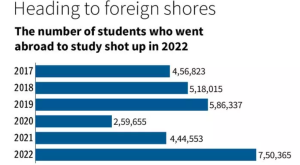| Resource Category | Specific Resource/Organization | Contact Information/Website | Key Support Offered |
|---|---|---|---|
| University Support | International Student Office | University Website (usually a dedicated page) | Visa guidance, administrative assistance, academic advising, cultural orientation programs, and access to financial aid resources. |
| Government Agencies | Embassy/Consulate of Host Country | Specific Embassy/Consulate Website | Detailed information on visa requirements, application procedures, and support services for international students. |
| Scholarship Providers | Scholarship Website/Contact | Specific Scholarship Website | Guidance on application procedures, eligibility criteria, and deadlines, often with FAQs and helpful resources. |
| Student Support Groups | International Student Associations/Forums | University Website or online platforms | Networking opportunities, peer support, and information sharing regarding the academic environment and life in the host country. |
Financial Considerations
Securing funding is crucial for international students pursuing PhD studies. Beyond the scholarship itself, comprehensive financial planning is essential to manage living expenses, potential unexpected costs, and ensure a smooth academic journey. Understanding available financial aid options and proactive expense management are key factors in successful PhD completion.International students often face unique financial challenges. Navigating unfamiliar systems, fluctuating exchange rates, and the high cost of living in a new country can be daunting.
Proper financial planning mitigates these challenges, empowering students to focus on their studies and research without the added stress of financial uncertainty.
Financial Aid Options
International students have access to a variety of financial aid options beyond scholarships. Understanding these avenues allows students to build a robust financial support network. These options can range from government grants to personal loans and part-time employment opportunities.
- Scholarships: Many institutions and organizations offer scholarships specifically for international students, recognizing the unique challenges they face. These often cover tuition fees and living expenses, providing a significant financial boost.
- Government Grants: Some countries offer grants or financial aid packages to support international students pursuing higher education. These grants can help with tuition fees or living expenses, easing the burden on students.
- Personal Loans: Banks and financial institutions offer personal loans for education purposes. These loans often come with interest and repayment terms that need careful consideration before accepting. Interest rates and repayment terms should be thoroughly reviewed to ensure affordability.
- Part-Time Employment: Many institutions and organizations allow students to work part-time while studying. This can be a valuable source of income to cover living expenses and contribute to the overall financial well-being of the student. It’s crucial to comply with visa regulations and university policies regarding part-time work to avoid any complications.
Managing Living Expenses
Careful budgeting and expense management are essential for international students. A well-structured budget can help students allocate funds effectively, ensuring they have enough to cover essential expenses without exceeding their available resources. Creating a detailed budget, tracking expenses, and prioritizing needs are crucial steps in this process.
- Accommodation Costs: Housing costs vary significantly depending on the location and type of accommodation. International students should research and compare options to find the most affordable and suitable housing for their needs. Factors such as proximity to the university and amenities should be considered in the decision-making process. Sharing accommodation with other students can sometimes significantly reduce housing costs.
- Food Costs: Food expenses can also be substantial. International students can save money by planning meals, utilizing grocery stores for affordable options, and taking advantage of student discounts or coupons. Cooking meals at home rather than eating out frequently can be a cost-effective way to manage food expenses.
- Transportation Costs: Transportation expenses can vary depending on the mode of transportation used and the distance covered. International students should consider public transportation options, which are often more affordable than private vehicles. Bicycle or walking are other options to consider when feasible.
- Miscellaneous Expenses: Unexpected expenses can arise during the course of study. Creating a contingency fund to handle such expenses is a good strategy. This fund can provide a safety net to cover unexpected costs and ensure that students are financially prepared for any unforeseen circumstances. This should be reviewed periodically to ensure its adequacy and effectiveness.
Funding Sources Beyond Scholarships
Exploring diverse funding sources can significantly supplement scholarship funds. This proactive approach can strengthen the financial foundation for students and provide a buffer against potential financial constraints. This is especially important for international students, who may face additional financial challenges.
- Personal Savings: Utilizing personal savings can provide a crucial financial cushion, particularly for unexpected expenses. Students should consider the amount of personal savings they have and use it wisely to ensure its longevity throughout their studies.
- Family Support: Many international students receive support from their families, which can be a crucial element of their financial plan. Open communication and planning with family members regarding financial support can ensure a smooth and manageable study period. This should be done well in advance to avoid potential complications.
- Part-Time Jobs: Working part-time can help offset living expenses and contribute to a more stable financial situation. Students should explore opportunities that align with their academic schedule and visa regulations to avoid any complications.
Highlighting Research Interests
A strong demonstration of research interests is crucial for securing a PhD scholarship. Applicants must effectively communicate their passion and alignment with the scholarship’s research focus. This section delves into strategies for showcasing these interests, linking them to specific opportunities, and crafting compelling research statements.Effective communication of research interests is key to a successful scholarship application. Applicants must demonstrate a deep understanding of their chosen field and how their research aligns with the scholarship’s objectives.
This includes clearly articulating their specific research questions, methodologies, and anticipated contributions to the field.



